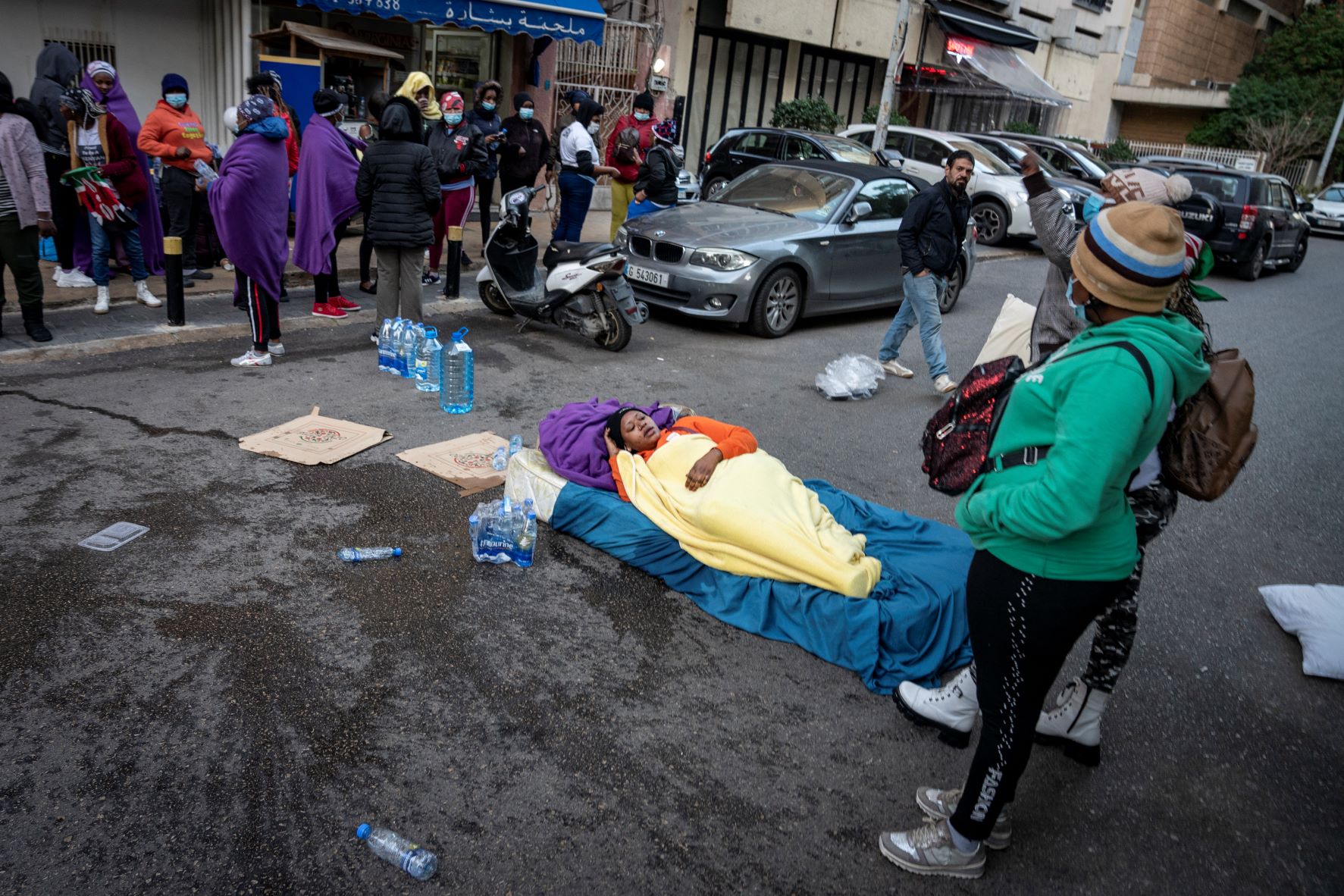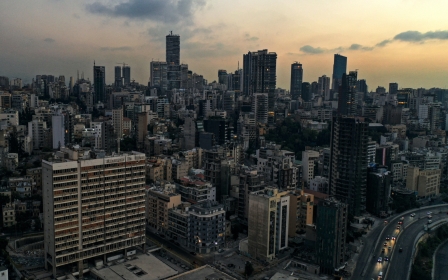Lebanon: Kenyan migrant workers camp outside consulate demanding to return home

Over the past week a group of around 20 Kenyan women have been camped outside the east African country's consulate in Beirut. The women, who all originally came to Lebanon as housemaids, are waiting to be repatriated, having been forced to leave their places of work in the midst of an economic crisis that continues to wreak havoc with ordinary people's lives.
They have all faced varying hardships, relating stories of physical and sexual abuse, and have been left with little option but to return home.
Some of the women claim to have been waiting months to leave, having faced delays and obfuscation from their employment agencies and the consulate, as well as being instructed to raise the funds to pay for their flights home.
New MEE newsletter: Jerusalem Dispatch
Sign up to get the latest insights and analysis on Israel-Palestine, alongside Turkey Unpacked and other MEE newsletters
Fed up with waiting in shelters and struggling to pay for flights with no current earnings, let alone money to send home, they have run out of options and patience, and have camped outside the doors of the consulate.
One of the women told Middle East Eye she had travelled to Lebanon in November 2021, having been promised a salary of $300 by her agents. When she arrived, her employers said they could only afford to pay her $150. The woman (who spoke on condition of anonymity) could not afford to accept the work, knowing it would not be enough to feed her children in Kenya and pay for their school fees.
"I am so stressed. I have people that are depending on me,” she said.
Having gone to the consulate to request to be returned home, she said she was told she would have to find work to raise the money for her flight to Kenya. In the months since, she has struggled to earn any money at all, and has stayed with a friend. All the while her recruitment agency has held her passport.
'I just want to go home'
Over the past two weeks, as word has spread about the group, more women have joined them, hoping to return to Kenya. The group has grown in size from six women to around 20, some camping with all of their belongings.
The scenes in the Badaro area of Beirut are reminiscent of August 2020, when dozens of Kenyan migrant domestic workers were left outside on the same street following the 4 August explosion at the Beirut port. Their employers had left them there, unable to continue paying their wages.
17 months on, Lebanon continues to endure multiple financial and economic crises, of which migrant workers have borne the brunt, leaving them vulnerable to further abuse and exploitation.
“I just want to go home, that is all I need now," the anonymous Kenyan told MEE.
Another of the women said she has been trying since October last year to leave Lebanon. She says she was initially promised by the consulate she would be returning home in two weeks, but had until recently been staying in a shelter for three months. She said, “I cannot continue to stay, because my father is sick. He had a stroke and became paralysed. I cannot stay here any longer without earning money, I am not gaining anything. Just let me go home.”
No legal protection
Kassem Jaber, an assistant at the Kenyan consulate, has denied any wrongdoing, telling MEE, “We never ask a girl to go and work [to pay for repatriation flights].” In 2020, Jaber was accused of exploiting and verbally and physically abusing Kenyan women, allegations he denied.
Jaber has made assurances that the women will be repatriated soon, urging that they return to their shelters, saying the protest has stopped them from being able to function.
'The abuse that these women are suffering is a direct result of Lebanon’s exploitative and abusive kafala system, which in the worst cases can lead to situations of modern slavery'
- Aya Majzoub, Human Rights Watch
“They will leave as soon as we resume our work in the consulate,” he says.
Many of the estimated 250,000 migrant domestic workers in Lebanon are excluded from protection under Lebanon’s labour laws, leaving them vulnerable to abuse, rights groups say.
“The abuse that these women are suffering is a direct result of Lebanon’s exploitative and abusive kafala system, which in the worst cases can lead to situations of modern slavery,” says Aya Majzoub, Lebanon researcher for Human Rights Watch. “The Lebanese government, countries of origin, and international humanitarian agencies should ensure that those workers who want to return home can do so."
Middle East Eye delivers independent and unrivalled coverage and analysis of the Middle East, North Africa and beyond. To learn more about republishing this content and the associated fees, please fill out this form. More about MEE can be found here.






